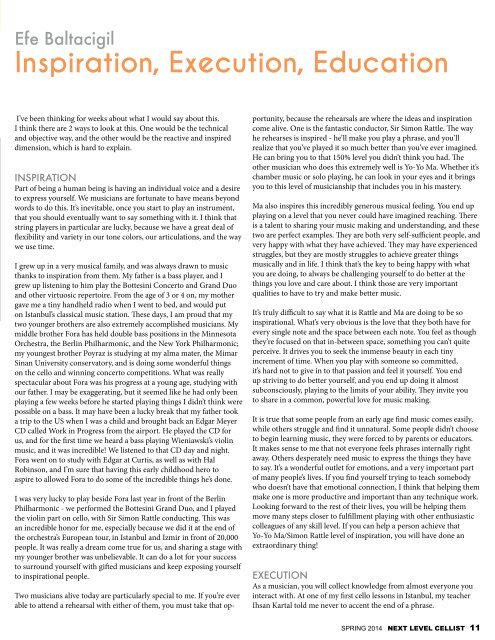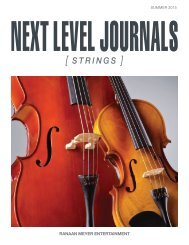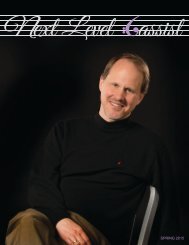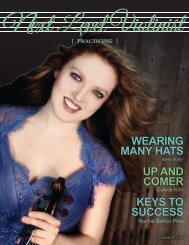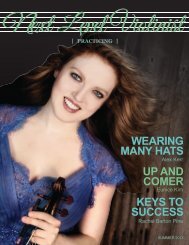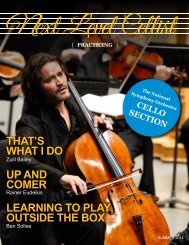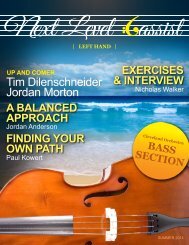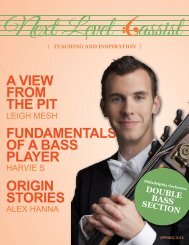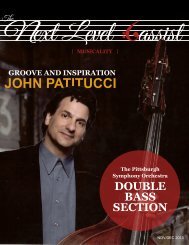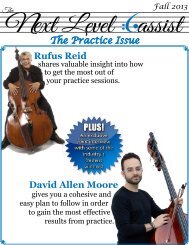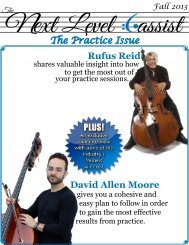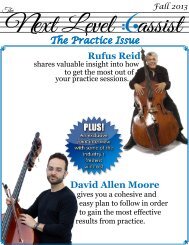Next Level Cellist Musicality Issue
Featuring articles by Alisa Weilerstein and Efe Baltacigil, a spotlight on the Chicago Symphony Cello section, and a duet by Ranaan Meyer
Featuring articles by Alisa Weilerstein and Efe Baltacigil, a spotlight on the Chicago Symphony Cello section, and a duet by Ranaan Meyer
You also want an ePaper? Increase the reach of your titles
YUMPU automatically turns print PDFs into web optimized ePapers that Google loves.
Efe Baltacigil<br />
Inspiration, Execution, Education<br />
I’ve been thinking for weeks about what I would say about this.<br />
I think there are 2 ways to look at this. One would be the technical<br />
and objective way, and the other would be the reactive and inspired<br />
dimension, which is hard to explain.<br />
INSPIRATION<br />
Part of being a human being is having an individual voice and a desire<br />
to express yourself. We musicians are fortunate to have means beyond<br />
words to do this. It’s inevitable, once you start to play an instrument,<br />
that you should eventually want to say something with it. I think that<br />
string players in particular are lucky, because we have a great deal of<br />
flexibility and variety in our tone colors, our articulations, and the way<br />
we use time.<br />
I grew up in a very musical family, and was always drawn to music<br />
thanks to inspiration from them. My father is a bass player, and I<br />
grew up listening to him play the Bottesini Concerto and Grand Duo<br />
and other virtuosic repertoire. From the age of 3 or 4 on, my mother<br />
gave me a tiny handheld radio when I went to bed, and would put<br />
on Istanbul’s classical music station. These days, I am proud that my<br />
two younger brothers are also extremely accomplished musicians. My<br />
middle brother Fora has held double bass positions in the Minnesota<br />
Orchestra, the Berlin Philharmonic, and the New York Philharmonic;<br />
my youngest brother Poyraz is studying at my alma mater, the Mimar<br />
Sinan University conservatory, and is doing some wonderful things<br />
on the cello and winning concerto competitions. What was really<br />
spectacular about Fora was his progress at a young age, studying with<br />
our father. I may be exaggerating, but it seemed like he had only been<br />
playing a few weeks before he started playing things I didn’t think were<br />
possible on a bass. It may have been a lucky break that my father took<br />
a trip to the US when I was a child and brought back an Edgar Meyer<br />
CD called Work in Progress from the airport. He played the CD for<br />
us, and for the first time we heard a bass playing Wieniawski’s violin<br />
music, and it was incredible! We listened to that CD day and night.<br />
Fora went on to study with Edgar at Curtis, as well as with Hal<br />
Robinson, and I’m sure that having this early childhood hero to<br />
aspire to allowed Fora to do some of the incredible things he’s done.<br />
I was very lucky to play beside Fora last year in front of the Berlin<br />
Philharmonic - we performed the Bottesini Grand Duo, and I played<br />
the violin part on cello, with Sir Simon Rattle conducting. This was<br />
an incredible honor for me, especially because we did it at the end of<br />
the orchestra’s European tour, in Istanbul and Izmir in front of 20,000<br />
people. It was really a dream come true for us, and sharing a stage with<br />
my younger brother was unbelievable. It can do a lot for your success<br />
to surround yourself with gifted musicians and keep exposing yourself<br />
to inspirational people.<br />
Two musicians alive today are particularly special to me. If you’re ever<br />
able to attend a rehearsal with either of them, you must take that opportunity,<br />
because the rehearsals are where the ideas and inspiration<br />
come alive. One is the fantastic conductor, Sir Simon Rattle. The way<br />
he rehearses is inspired - he’ll make you play a phrase, and you’ll<br />
realize that you’ve played it so much better than you’ve ever imagined.<br />
He can bring you to that 150% level you didn’t think you had. The<br />
other musician who does this extremely well is Yo-Yo Ma. Whether it’s<br />
chamber music or solo playing, he can look in your eyes and it brings<br />
you to this level of musicianship that includes you in his mastery.<br />
Ma also inspires this incredibly generous musical feeling. You end up<br />
playing on a level that you never could have imagined reaching. There<br />
is a talent to sharing your music making and understanding, and these<br />
two are perfect examples. They are both very self-sufficient people, and<br />
very happy with what they have achieved. They may have experienced<br />
struggles, but they are mostly struggles to achieve greater things<br />
musically and in life. I think that’s the key to being happy with what<br />
you are doing, to always be challenging yourself to do better at the<br />
things you love and care about. I think those are very important<br />
qualities to have to try and make better music.<br />
It’s truly difficult to say what it is Rattle and Ma are doing to be so<br />
inspirational. What’s very obvious is the love that they both have for<br />
every single note and the space between each note. You feel as though<br />
they’re focused on that in-between space, something you can’t quite<br />
perceive. It drives you to seek the immense beauty in each tiny<br />
increment of time. When you play with someone so committed,<br />
it’s hard not to give in to that passion and feel it yourself. You end<br />
up striving to do better yourself, and you end up doing it almost<br />
subconsciously, playing to the limits of your ability. They invite you<br />
to share in a common, powerful love for music making.<br />
It is true that some people from an early age find music comes easily,<br />
while others struggle and find it unnatural. Some people didn’t choose<br />
to begin learning music, they were forced to by parents or educators.<br />
It makes sense to me that not everyone feels phrases internally right<br />
away. Others desperately need music to express the things they have<br />
to say. It’s a wonderful outlet for emotions, and a very important part<br />
of many people’s lives. If you find yourself trying to teach somebody<br />
who doesn’t have that emotional connection, I think that helping them<br />
make one is more productive and important than any technique work.<br />
Looking forward to the rest of their lives, you will be helping them<br />
move many steps closer to fulfillment playing with other enthusiastic<br />
colleagues of any skill level. If you can help a person achieve that<br />
Yo-Yo Ma/Simon Rattle level of inspiration, you will have done an<br />
extraordinary thing!<br />
EXECUTION<br />
As a musician, you will collect knowledge from almost everyone you<br />
interact with. At one of my first cello lessons in Istanbul, my teacher<br />
Ihsan Kartal told me never to accent the end of a phrase.<br />
SPRING 2014 NEXT LEVEL CELLIST 11


